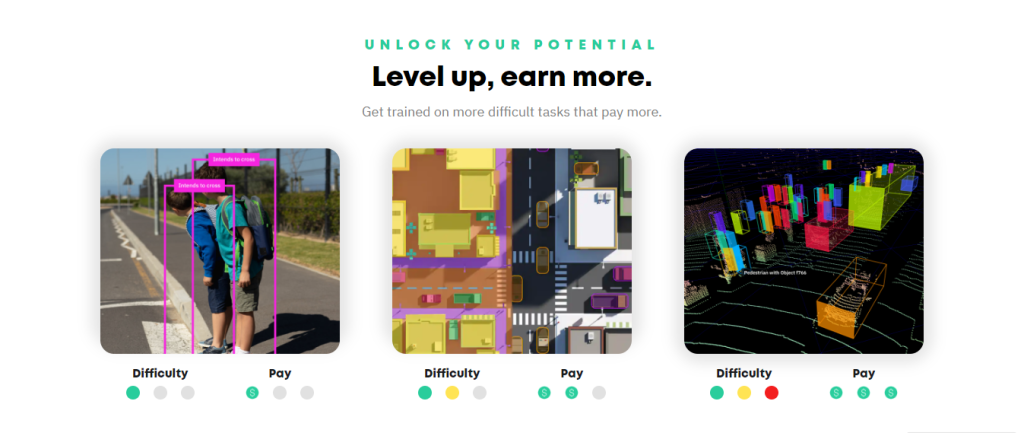Remotasks has been one of the most popular websites for gig workers in Kenya, offering opportunities to earn income by offering microtasks like data labelling, image annotation, and transcription.
For many Kenyan online workers, Remotasks provided a flexible way to make money online without having to work a formal job. However, Remotasks recently exited Kenya, leaving online workers frustrated, and scrambling for alternatives.
What is Remotasks?
Remotasks is an online micro-tasking platform that links online workers with companies that need help with data processing tasks such as image annotation, transcription, and data categorization.
Gig workers perform these tasks remotely from anywhere around the world, earning money based on the number of tasks they complete. Founded in 2017, Remotasks became especially popular in Kenya, where workers could earn in dollars and benefit from the flexibility of working from home.
Generally, freelancers on Remotasks are trained and vetted to ensure they can complete tasks accurately and efficiently. Most tasks revolve around preparing data for machine learning models, making Remotasks part of the broader AI and data labeling economy.
How Remotasks works
Remotasks is a pay-per-task platform that received tasks from various AI companies, and in turn outsources the work to the registered and verified users on the platform.
The company categorizes tasks into six categories, and freelancers can take up tasks such as data labelling, AI model training, and copywriting. The company pays completed tasks in dollars, and you can expect to receive payments via PayPal.

According to information published on Remotasks website, the company pays per accepted task, and the amount of pay varies depending on the task complexity. It pays via PayPal every Thursday, and you must have a valid PayPal account to receive payouts.
Why is Remotaskss banned in Kenya?
On March 2024, Remotasks shut down its operations in Kenya, affecting thousands of unemployed youths to earn an income on the website.
Active Remotasks users were also notified via email that the website would no longer be accessible from March 8, 2024.

“We are reaching out with an important announcement regard Remotaskss operations in your location. We are discontinuing operations in your current location effective March 8, 2024,” the email read.
“As part of this change, you have been off-boarded from your current project. You will receive outstanding payments associated with your tasks completed via your payment account on your profile,” the email added.
Potential reasons for the ban
Earlier in February, President Ruto interacted with Brian Kipchumba, an ICT student from Kaiboi Polytechnic in Nandi country, who narrated how he made money online through Remotasks. Kipchumba revealed that he had earned $284 (equivalent to Ksh.37,000), which helped him meet his daily expenses as a stident.
The interaction between President Ruto and Kipchumba made Remotasks popular in Kenya, with many Kenyans thronging to the platform to get a share of the dollars. However, many Remotaskss users in Kenya described their discontent with Kipchumba’s revelation on social media, citing that governmental supervision would affect the platform’s operations in the country.
Other possible reasons for the ban could be unethical practices among Kenyan freelancers, such as selling registered Remotasks accounts, using VPN to access better-paying jobs, and taskers submitting substandard work.
Is Remotasks Legit?
Yes, Remotasks is a legitimate remote jobs platform used by thousands of freelancers worldwide. It has been in operation since 2017 and is owned by Scale AI, a well-known company specializing in AI data labeling.

The platform has paid millions of dollars to its workers globally, and many users who have worked with the company have shared their experience on websites like glassdoor.com. However, like many gig platforms, it has faced criticism regarding pay rates, the volume of work available, and sudden account suspensions.
In August 2023, the Washington Post exposed how Remotasks unfairly remunerated and withheld payments of Filipino online workers.
How much can a beginner earn in Remotaskss?
Earnings on Remotasks vary depending on the type and complexity of the tasks completed. For beginners, tasks like transcription or simple image annotation typically pay less compared to more complex tasks such as 3D annotation or LIDAR labeling.
On average, beginners starting out on Remotasks can earn anywhere from $1 to $5 per hour, depending on their speed and volume of tasks completed. More experienced workers who tackle higher-paying and complex tasks can earn significantly more, sometimes up to $18 per hour.
Remotasks alternatives in Kenya
While Remotasks was a popular platform in Kenya, there are several other gig work platforms that freelancers can turn to for online earning opportunities.
Some of these alternatives include:
Appen
A global platform similar to Remotasks, where workers can perform microtasks related to AI and machine learning data processing. Appen is widely regarded for offering a variety of tasks, and it remains accessible to Kenyan freelancers.
Clickworker
Another micro-tasking platform that offers a wide range of online jobs, from writing and research to categorization tasks. Like Remotasks, Clickworker allows freelancers to work remotely on a flexible schedule.
Upwork
A broader freelancing platform that allows Kenyans to offer their skills in areas like writing, graphic design, and web development. Upwork generally offers higher-paying gigs but requires more specific skills and expertise. Upwork users in Kenya can get paid via Mpesa or direct bank transfer.


